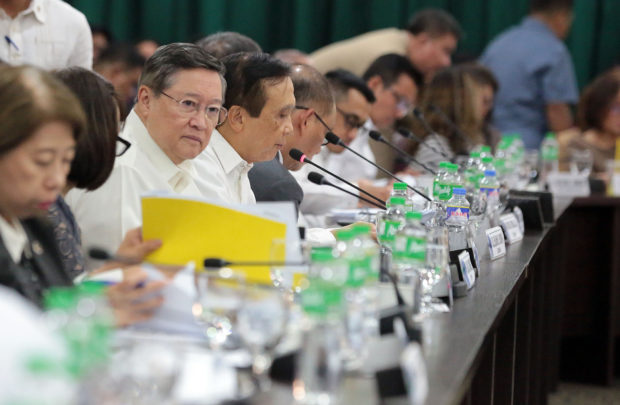Economic managers recommend motion for reconsideration vs SC ruling on source of LGUs’ IRA

Finance Secretary Carlos Dominguez (facing camera), National Economic Development Authority Secretary Ernesto Pernia and Budget Secretary Benjamin Diokno (partly hidden) attends the budget hearing in Congress on Tuesday, July 31, 2018. INQUIRER PHOTO / GRIG C. MONTEGRANDE
Economic managers have pushed the filing of a motion for reconsideration against the Supreme Court ruling that allowed local government units (LGUs) to source their share of internal revenue allotment (IRA) from “all” national taxes.
“The DBCC yesterday recommended to the President to file a motion for reconsideration,” Finance Secretary Carlos G. Dominguez III told the House appropriations committee hearing on the proposed 2019 national budget, referring to the Cabinet-level Development Budget Coordination Committee.
The motion for reconsideration would be filed by the Office of the Solicitor General, Budget Secretary Benjamin E. Diokno said separately, without disclosing details.
The deadline for filing of the motion for reconsideration would be Aug. 8, Diokno added.
A prospective implementation of the ruling meant that the national budget for 2019 should have an additional P195 billion on top of the P575.5 billion in LGUs’ IRA shares from national internal revenue taxes collected in 2016 to be disbursed in 2019, bringing the total to over P771 billion, Dominguez said.
To recall, the Supreme Court recently ruled that the “just share” of LGUs’ IRA must come from all national taxes and not only from national internal revenue taxes as done at present.
In 2012, former Batangas representative and now Governor Hermilando Mandanas filed a petition before the High Court alleging that between 1992 and 2012, P500 billion in IRA were unreleased to LGUs across provinces, cities, municipalities and barangays nationwide due to alleged wrong calculations.
“All national taxes” meant including collections from import duties and other levies by the Bureau of Customs.
Internal revenue taxes, meanwhile, referred to those collected by the Bureau of Internal Revenue such as documentary stamp tax, donor’s tax, excise tax, estate tax, income tax, as well as value-added tax.
Last week, Dominguez sought a careful implementation of the Supreme Court ruling.
“The intended beneficiaries of the ruling should be made aware that the issue is not a simple matter and thus, should be implemented with due care to ensure that the government maintains its strong fiscal position,” Dominguez said in a statement.
“We should communicate that this issue is not a simple matter. Both Fitch and Moody’s have put a red flag as warning regarding this Supreme Court ruling. They are fully aware of the ruling’s possible risks,” Dominguez added, referring to reports released by the two debt watchers in July.
“While both credit rating agencies remain bullish on the country’s high growth prospects over the medium term, they both mentioned the Supreme Court ruling as a possible challenge to effective public finance management,” Dominguez noted.
The Philippines enjoys investment grade credit ratings from the top three debt watchers, namely Moody’s Investors Service, Fitch Ratings and S&P Global Ratings.
Credit ratings are a measure of a government’s creditworthiness. As the stability of state finances is also related to a country’s performance, credit scores serve as a proxy grade for the economy.
Improved ratings would allow the government to demand lower rates when it borrows from lenders, which could translate to lower interest rates for consumers and businesses borrowing from banks using government-issued debt paper as benchmarks for their loans.
